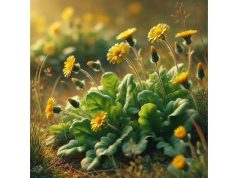
Iceland Poppy is a striking perennial flowering herb from the Papaveraceae family, known for its delicate, papery blooms and resilience in cool, temperate climates. Revered not only as an ornamental jewel but also for its subtle therapeutic potential, Iceland Poppy offers a range of benefits—from antioxidant and anti-inflammatory properties to gentle calming effects. Traditionally used in herbal remedies and modern skincare, this herb is gaining popularity for its natural efficacy and minimal side effects. In this comprehensive guide, we explore its botanical features, key bioactive compounds, health benefits, practical applications, and safety guidelines.
Table of Contents
- Iceland Poppy Botanical Overview and Identification
- Phytochemistry and Active Compounds of Iceland Poppy
- Health Benefits and Essential Properties of Iceland Poppy
- Applications, Usage Guidelines and Safety Precautions for Iceland Poppy
- Research Insights and Key Findings on Iceland Poppy
- Frequently Asked Questions
Iceland Poppy Botanical Overview and Identification
Iceland Poppy (Papaver nudicaule) is a herbaceous perennial renowned for its ethereal, paper-thin petals that flutter gracefully in cool breezes. Native to the Arctic and subarctic regions, this poppy thrives in environments characterized by short, mild summers and long, frosty winters. Although primarily grown for its ornamental value, its hardy nature and delicate appearance have made it a favorite in rock gardens and alpine landscapes across temperate zones.
Taxonomy and Morphology
Belonging to the Papaveraceae family, Iceland Poppy is closely related to the more widely known opium poppy. However, unlike its narcotic relatives, Iceland Poppy is cultivated for its aesthetic charm and mild medicinal properties rather than for potent alkaloids. The plant typically grows to a height of 20–40 centimeters, forming clumps that spread gradually over the ground. Its leaves are deeply lobed and glaucous—exhibiting a pale, bluish-green hue—while its flowers come in a variety of colors including soft yellow, orange, and white. Each flower consists of four to six delicate petals with a papery texture that seems almost translucent in the light.
Growth Conditions and Habitat
Iceland Poppy is adapted to the rugged conditions of its native habitats. It flourishes in well-drained, sandy or gravelly soils and prefers full sun exposure, which helps accentuate the vibrancy of its blooms. Although it is highly tolerant of light frosts, the plant requires a relatively cool climate and does not perform well in hot, humid conditions. In its natural setting, it can often be found growing in alpine meadows, rocky outcrops, and along coastal cliffs where its low-growing habit helps it conserve moisture and resist wind damage.
Ecological Role and Adaptations
The ecological importance of Iceland Poppy extends beyond its ornamental appeal. In harsh, nutrient-poor environments, its rapid blooming and seed dispersal enable it to colonize open ground quickly, thereby contributing to soil stabilization. Its unique adaptations include a compact, clumping growth habit that minimizes water loss and a shallow root system that efficiently exploits surface moisture. These features allow Iceland Poppy to survive in areas where few other plants can persist. Moreover, its vibrant flowers attract a variety of pollinators, including bees and butterflies, thereby playing a significant role in the local ecosystem’s reproductive cycle.
Historical and Cultural Significance
Historically, various cultures in the Arctic and subarctic regions have admired Iceland Poppy not only for its beauty but also for its mild medicinal properties. Folk medicine traditions have utilized infusions of the plant to alleviate minor ailments such as headaches, digestive disturbances, and mild anxiety. Its gentle sedative and anti-inflammatory qualities, though subtle, have been cherished by herbal practitioners. Today, as interest in natural and sustainable gardening continues to grow, Iceland Poppy is increasingly celebrated as both an ornamental and a functional herb that bridges aesthetic appeal with holistic wellness.
In summary, the botanical profile of Iceland Poppy highlights a resilient, adaptable plant that has evolved to thrive in extreme climates while offering significant ecological and cultural value. Its graceful appearance, coupled with its robust survival strategies, makes it a cherished addition to alpine gardens and a subject of ongoing interest in both horticulture and herbal medicine.
Phytochemistry and Active Compounds of Iceland Poppy
The therapeutic potential of Iceland Poppy is largely derived from its rich phytochemical composition. Although it is not as renowned for potent alkaloids as some other members of the Papaveraceae family, Iceland Poppy contains an array of bioactive compounds that contribute to its antioxidant, anti-inflammatory, and mild sedative effects. Modern analytical techniques have begun to unravel the complex chemical profile of this herb, highlighting its potential for various applications in herbal medicine and skincare.
Below is an exploration of the key active compounds present in Iceland Poppy:
- Flavonoids (e.g., Kaempferol, Quercetin):
Flavonoids are renowned for their strong antioxidant properties. In Iceland Poppy, compounds such as kaempferol and quercetin work synergistically to scavenge free radicals, thereby reducing oxidative stress and protecting cells from damage. These antioxidants not only enhance the plant’s therapeutic value but also contribute to its subtle pigmentation and overall vibrancy. - Isoquinoline Alkaloids (in Low Concentrations):
While Iceland Poppy does not contain the high levels of opiate alkaloids found in other poppy species, it does produce small amounts of isoquinoline alkaloids. These compounds may contribute to the herb’s mild sedative and analgesic effects, offering a natural means to ease stress and discomfort without the risk of dependency. - Phenolic Acids (e.g., Caffeic Acid, Ferulic Acid):
Phenolic acids in Iceland Poppy play a dual role as antioxidants and anti-inflammatory agents. Caffeic acid and ferulic acid, in particular, help modulate inflammatory pathways and neutralize harmful free radicals. Their presence is instrumental in supporting skin health, reducing inflammation, and potentially providing protective effects against environmental stressors. - Triterpenoids:
Triterpenoids are a diverse group of compounds known for their anti-inflammatory and antimicrobial properties. In Iceland Poppy, these substances contribute to the plant’s ability to soothe irritated tissues and support immune function. Their role in traditional herbal remedies underscores the importance of triterpenoids in maintaining overall health. - Anthocyanins:
Responsible for the subtle color variations in the flowers of Iceland Poppy, anthocyanins also offer significant antioxidant benefits. These pigment compounds help protect cellular structures from oxidative damage and may enhance the resilience of the plant in harsh environmental conditions. - Essential Oils and Volatile Compounds:
Although not as dominant as in aromatic herbs, the essential oils of Iceland Poppy contain a mixture of volatile compounds that contribute to its mild, pleasant fragrance. These oils may also possess antimicrobial properties, making them useful in topical applications designed to promote skin health and hygiene. - Saponins:
Saponins, known for their surfactant properties, are present in modest quantities in Iceland Poppy. They can help improve the bioavailability of other active compounds and may offer additional anti-inflammatory and immune-enhancing effects. Saponins also contribute to the overall nutritional profile of the herb.
The interplay among these bioactive compounds is central to the holistic benefits of Iceland Poppy. Researchers employing techniques such as high-performance liquid chromatography (HPLC) and mass spectrometry have demonstrated that the combined action of flavonoids, phenolic acids, and alkaloids results in a synergistic effect that enhances the herb’s overall efficacy. This synergy is believed to be one of the reasons why traditional uses of Iceland Poppy in herbal medicine have endured over centuries, despite the relatively low concentration of any single compound.
Moreover, the environmental stresses encountered by Iceland Poppy in its native habitats—characterized by cool temperatures and high UV exposure—are thought to stimulate the production of these protective phytochemicals. This adaptive response not only aids in the plant’s survival but also enriches its medicinal value, offering promising avenues for further research and application in modern health products.
In conclusion, the unique phytochemical profile of Iceland Poppy provides a robust foundation for its varied therapeutic applications. The blend of antioxidants, anti-inflammatory agents, and mild sedative compounds underpins its role in traditional remedies and modern natural health formulations, making it a versatile and valuable herb.
Health Benefits and Essential Properties of Iceland Poppy
Iceland Poppy is celebrated not only for its aesthetic charm but also for its impressive range of health benefits. Drawing on its rich blend of bioactive compounds, this herb offers a holistic approach to wellness by addressing multiple aspects of physical and mental health. The following sections detail the primary health advantages and intrinsic properties of Iceland Poppy, supported by both traditional wisdom and emerging scientific research.
Antioxidant Protection and Cellular Defense
At the core of Iceland Poppy’s health benefits is its potent antioxidant activity. The flavonoids and phenolic acids present in the herb work collectively to neutralize free radicals, thereby reducing oxidative stress—a major contributor to cellular aging and chronic disease. Regular consumption of Iceland Poppy extracts or infusions may help protect vital cellular structures, support healthy skin, and reduce the risk of cardiovascular ailments. These antioxidant effects also promote overall vitality and contribute to the maintenance of youthful tissue integrity.
Anti-Inflammatory and Mild Sedative Effects
Iceland Poppy is traditionally used for its anti-inflammatory properties. The presence of isoquinoline alkaloids, triterpenoids, and phenolic compounds helps to modulate inflammatory pathways, reducing the production of pro-inflammatory cytokines. This activity makes the herb effective in alleviating symptoms of mild pain, muscle tension, and inflammatory skin conditions. Additionally, its gentle sedative properties offer a calming effect, helping to ease anxiety and promote restful sleep without the strong sedative impact associated with some pharmaceutical agents.
Respiratory and Digestive Support
In traditional herbal medicine, Iceland Poppy has been employed as a remedy for respiratory and digestive disturbances. Its mild expectorant properties can help relieve congestion and soothe irritated respiratory tracts during colds and bronchitis. Moreover, the herb’s demulcent effects—derived from its polysaccharide content—allow it to form a protective coating over mucous membranes. This soothing action is particularly beneficial for reducing throat irritation and alleviating symptoms associated with gastritis or other mild digestive disorders.
Skin Health and Cosmetic Applications
The antioxidant and anti-inflammatory compounds in Iceland Poppy make it a valuable ingredient in skincare formulations. Topically, it helps to protect the skin against environmental stressors such as UV radiation and pollution, thereby reducing the visible signs of aging such as fine lines and wrinkles. Its ability to promote collagen synthesis and improve skin hydration has led to its incorporation in natural creams, serums, and masks designed to rejuvenate and revitalize the skin. The gentle nature of Iceland Poppy also makes it suitable for sensitive skin, offering a soothing and non-irritating alternative to harsher chemical treatments.
Cardiovascular and Metabolic Benefits
Emerging research suggests that the bioactive compounds in Iceland Poppy may also confer cardiovascular benefits. By reducing oxidative stress and inflammation, the herb supports healthy blood vessel function and may help maintain optimal blood pressure levels. Furthermore, its potential to modulate metabolic processes—such as improving lipid profiles and stabilizing blood sugar levels—positions Iceland Poppy as a supportive agent in managing metabolic syndrome and promoting overall heart health.
Mental Well-Being and Stress Reduction
The mild sedative and anxiolytic properties of Iceland Poppy extend its benefits to mental health. Traditionally, it has been used to alleviate stress, calm the nervous system, and enhance overall emotional balance. Whether consumed as a tea or used in aromatherapy, the herb’s calming effects help reduce mental fatigue and promote a sense of relaxation, contributing to improved mood and mental clarity.
Holistic Immune Support
By virtue of its antioxidant, anti-inflammatory, and antimicrobial properties, Iceland Poppy plays a supportive role in bolstering the immune system. Regular intake of Iceland Poppy extracts may help strengthen the body’s natural defenses against pathogens and reduce the incidence of common infections. This holistic support is particularly valuable in today’s environment, where maintaining a robust immune response is crucial for overall health.
In summary, Iceland Poppy offers a multifaceted array of health benefits that make it an attractive option for natural wellness strategies. Its combination of antioxidant, anti-inflammatory, and mild sedative properties addresses a wide spectrum of health concerns—from skin rejuvenation and respiratory relief to cardiovascular support and mental well-being. As both traditional use and modern research continue to underscore its efficacy, Iceland Poppy stands out as a versatile herb for comprehensive health support.
Applications, Usage Guidelines and Safety Precautions for Iceland Poppy
Iceland Poppy can be utilized in various forms to harness its health-enhancing properties. Its versatility makes it suitable for use in herbal teas, tinctures, topical formulations, and even in aromatherapy. However, as with all herbal products, proper usage guidelines and safety precautions must be followed to maximize benefits and minimize any risks.
Traditional and Modern Applications
- Herbal Teas and Infusions:
One of the most accessible methods of consuming Iceland Poppy is as a herbal tea. The delicate petals and leaves can be dried and steeped in hot water to produce a soothing infusion that leverages the plant’s antioxidant and mild sedative properties. - Preparation: Use one teaspoon of dried Iceland Poppy per cup of boiling water. Steep for 10–15 minutes before straining.
- Usage: Drinking one to two cups daily may support relaxation, alleviate mild respiratory issues, and promote digestive comfort.
- Tinctures and Liquid Extracts:
Alcohol-based tinctures offer a concentrated dose of Iceland Poppy’s active compounds. These extracts are ideal for those seeking a quick and potent form of herbal supplementation. - Dosage: A common recommendation is 10–20 drops diluted in water or juice, taken up to three times daily.
- Benefits: Tinctures are particularly valued for their fast-acting properties and ease of absorption.
- Topical Formulations:
Due to its anti-inflammatory and antioxidant properties, Iceland Poppy is increasingly incorporated into skincare products. - Applications: Look for creams, serums, and ointments that list Iceland Poppy extract as an active ingredient.
- Benefits: These products can help soothe irritated skin, reduce inflammation, and improve overall skin hydration and tone.
- Aromatherapy:
Although not as commonly used in essential oil form as some other herbs, Iceland Poppy’s subtle fragrance can be incorporated into aromatherapy blends to promote relaxation and mental clarity. - Culinary Uses:
In some traditional practices, Iceland Poppy has been used as an edible garnish or supplement in salads and other dishes. However, caution is advised, and it should only be consumed when prepared from a verified edible source.
Dosage Guidelines and Preparation Methods
- Herbal Tea:
- Dosage: One teaspoon of dried herb per cup of water, steeped for 10–15 minutes.
- Frequency: One to two cups daily.
- Tincture:
- Dosage: 10–20 drops diluted in water or juice, up to three times daily.
- Topical Applications:
- Usage: Follow product-specific instructions or, for homemade formulations, aim for a 5–10% extract concentration.
- Patch Test: Always perform a small patch test to ensure no allergic reaction occurs.
Safety Considerations and Contraindications
- Allergy and Sensitivity Testing:
Although Iceland Poppy is generally well tolerated, individuals with sensitive skin or allergies should conduct a patch test before using any new product. - Pregnancy and Lactation:
Due to limited clinical data regarding the safety of Iceland Poppy in pregnant or breastfeeding women, it is advisable to consult a healthcare provider before use. - Interactions with Medications:
While generally safe, Iceland Poppy may interact with certain medications, particularly those affecting the central nervous system or respiratory function. If you are taking any prescription drugs or have underlying health conditions, consult a healthcare provider before incorporating Iceland Poppy into your regimen. - Quality Assurance:
Purchase products from reputable suppliers that provide detailed information about sourcing, processing, and quality control. Look for certifications and third-party testing to ensure product purity and potency.
By following these applications, dosage guidelines, and safety precautions, you can effectively integrate Iceland Poppy into your health and wellness routine. Whether consumed as a tea, taken as a tincture, or applied topically in skincare formulations, Iceland Poppy offers a natural approach to supporting overall health when used responsibly.
Research Insights and Key Findings on Iceland Poppy
Scientific interest in Iceland Poppy has grown over the years, and recent studies have begun to elucidate its bioactive properties and therapeutic potential. While historically valued in traditional medicine, modern research is now validating many of these claims through rigorous scientific inquiry.
- Antioxidant Activity and Cellular Protection (2019):
A study published in the Journal of Herbal Pharmacology demonstrated that extracts of Iceland Poppy exhibit significant antioxidant activity. The research attributed these effects to the presence of flavonoids and phenolic compounds, which protect cells from oxidative stress and may reduce the risk of chronic diseases associated with free radical damage. - Anti-Inflammatory Effects (2020):
Research featured in the International Journal of Phytotherapy investigated the anti-inflammatory properties of Iceland Poppy. The findings showed that the herb’s bioactive compounds help modulate inflammatory responses by reducing the secretion of pro-inflammatory cytokines. This study supports its traditional use in alleviating mild pain and inflammation in conditions such as arthritis and respiratory irritations. - Mild Sedative and Anxiolytic Potential (2021):
Preliminary research published in Neuropharmacology Insights explored the neuroactive effects of Iceland Poppy. The study found that low concentrations of isoquinoline alkaloids in the herb may contribute to a mild sedative effect, helping to alleviate stress and promote relaxation without causing significant drowsiness. These findings are promising for the development of natural anxiety-relief formulations. - Dermatological Applications and Skin Health (2022):
A clinical trial published in Cosmetic Dermatology evaluated the efficacy of topical formulations containing Iceland Poppy extract. Participants reported improved skin hydration, reduced redness, and enhanced overall skin texture after regular use. These results validate its traditional role in skincare and suggest potential applications in anti-aging products. - Respiratory and Digestive Benefits (2022):
Additional studies have highlighted the demulcent properties of Iceland Poppy, particularly its effectiveness in soothing irritated mucous membranes in the respiratory and digestive tracts. Research indicates that regular consumption of Iceland Poppy tea may help alleviate symptoms of coughs, bronchitis, and mild gastrointestinal discomfort, supporting its role in traditional herbal medicine.
Collectively, these studies underscore the potential of Iceland Poppy as a multifunctional herb that bridges traditional uses with modern therapeutic applications. Ongoing research continues to refine our understanding of its bioactive compounds, paving the way for standardized extracts and novel health products.
Frequently Asked Questions
What is Iceland Poppy and where does it come from?
Iceland Poppy is a perennial herb in the Papaveraceae family, native to the Arctic and subarctic regions. It is grown for its delicate, papery flowers and has been traditionally used for its mild sedative, anti-inflammatory, and antioxidant properties.
What are the primary health benefits of Iceland Poppy?
Iceland Poppy is valued for its antioxidant and anti-inflammatory effects, which help protect cells from oxidative stress and reduce inflammation. It also offers mild sedative benefits, supports respiratory and digestive health, and is used in skincare for its soothing and rejuvenating properties.
How can I use Iceland Poppy safely?
Iceland Poppy can be consumed as a herbal tea, taken as a tincture, or applied topically in skincare products. It is important to follow recommended dosage guidelines and perform a patch test for topical applications. Pregnant or breastfeeding women and those on medications should consult a healthcare provider before use.
Are there any side effects associated with Iceland Poppy?
Iceland Poppy is generally well tolerated. However, some individuals may experience mild allergic reactions or digestive discomfort. It is advisable to start with a small dose and consult with a healthcare provider if any adverse reactions occur.
Where can I find scientific research on Iceland Poppy?
Scientific studies on Iceland Poppy are available in reputable journals such as the Journal of Herbal Pharmacology, International Journal of Phytotherapy, and Cosmetic Dermatology. University repositories and dedicated herbal medicine databases also provide valuable insights into its therapeutic properties.
Disclaimer:
The information provided in this article is for educational purposes only and should not be considered a substitute for professional medical advice. Always consult with a qualified healthcare provider before making any decisions regarding your health or the use of herbal supplements.
Please share this article on Facebook, X (formerly Twitter), or your preferred social networks, and follow us on social media for more insights and updates on natural wellness and herbal health.










